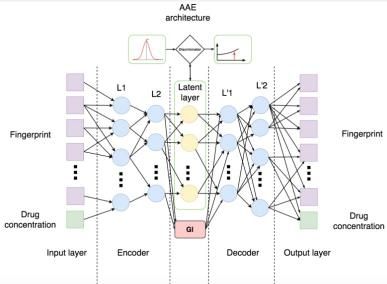Summary:
- Clinical trial failure rates for small molecules in oncology exceed 94% for molecules previously tested in animals and the costs to bring a new drug to market exceed $2.5 billion
- There are around 2,000 drugs approved for therapeutic use by the regulators with very few providing complete cures
- Advances in deep learning demonstrated superhuman accuracy in many areas and are expected to transform industries, where large amounts of training data is available
- Generative Adversarial Networks (GANs), a new technology introduced in 2014 represent the “cutting edge” in artificial intelligence, where new images, videos and voice can be produced by the deep neural networks on demand
- Here for the first time we demonstrate the application of Generative Adversarial Autoencoders (AAEs), a new type of GAN, for generation of molecular fingerprints of molecules that kill cancer cells at specific concentrations
- This work is the proof of concept, which opens the door for the cornucopia of meaningful molecular leads created according to the given criteria
- The study was published in Oncotarget and the open-access manuscript is available in the Advance Open Publications section
- Authors speculate that in 2017 the conservative pharmaceutical industry will experience a transformation similar to the automotive industry with deep learned drug discovery pipelines integrated into the many business processes
- The extension of this work will be presented at the “4th Annual R&D Data Intelligence Leaders Forum” in Basel, Switzerland, Jan 24-26th, 2017
Thursday, 22nd of December Baltimore, MD — Scientists at the Pharmaceutical Artificial Intelligence (pharma. AI) group of Insilico Medicine, Inc, today announced the publication of a seminal paper demonstrating the application of generative adversarial autoencoders (AAEs) to generating new molecular fingerprints on demand. The study was published in Oncotarget on 22nd of December, 2016. The study represents the proof of concept for applying Generative Adversarial Networks (GANs) to drug discovery. The authors significantly extended this model to generate new leads according to multiple requested characteristics and plan to launch a comprehensive GAN-based drug discovery engine producing promising therapeutic treatments to significantly accelerate pharmaceutical R&D and improve the success rates in clinical trials.

Do I understand this correctly and we do not need the pharmaceutical companies any more?
@Transhuman The trend is for AIs to do more of the work at drug companies. It will be a while until they do 100% of the work.